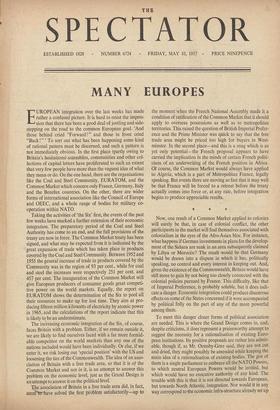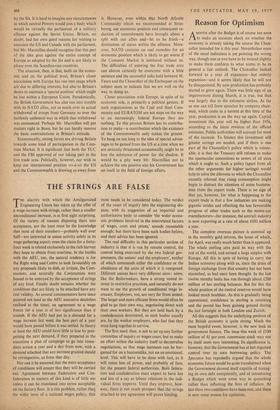MANY EUROPES
EUROPEAN integration over the last weeks has made rather a confused picture. It is hard to resist the impres- sion that there has been a good deal of jostling and side- stepping on the road to the common European goal. 'And those behind cried "Forward !" and those in front cried "Back ! " ' To sort out what has been happening some kind of rational pattern must be discerned, and such a pattern is not immediately obvious. In the first place (partly owing to Britain's hesitations) assemblies, communities and other col- lections of capital letters have proliferated to such an extent that very few people have more than the vaguest idea of what they mean or do. On the one hand, there are the organisations like the Coal and Steel Community, EURATOM, and the Common Market which concern only France, Germany, Italy and the Benelux countries. On the other, there are wider forms of international association like the Council of Europe and OEEC, and a whole range of bodies for military co- operation within NATO.
Taking the activities of 'the Six' first, the events of the past few weeks have marked a further extension of their economic integration. The preparatory period of the Coal and Steel Authority has come to an end, and the full provisions of the treaty are now in force. The Common Market treaty has been signed, and what may be expected from it is indicated by the great expansion of trade which has taken place in products covered by the.Coal and Steel Community. Between 1952 and 1955 the general increase of trade in products covered by the Community was in the region of 93 per cent., while for coal and steel the increases were respectively 251 per cent. and 457 per cent. The inauguration of the Common Market will give European producers of consumer goods great competi- tive power on the world markets. Equally, the report on EURATOM shows the determination of the Six to pool all their resources to make up for lost time. They aim at pro- ducing fifteen million kilowatts of electricity by atomic power in 1965, and the calculations of the report indicate that this is likely to be an underestimate. The increasing economic integration of the Six, of course, faces Britain with a problem. Either, if we remain outside it, we are likely to find ourselves faced with a far more formid- able competitor on the world markets than any one of the nations included would have been individually. Or else, if we enter it, we risk losing our 'special position' with the US and loosening the ties of the Commonwealth. The idea of an asso- ciation of Britain with a free trade area, so that it is of the Common Market and not in it, is an attempt to answer this problem on the economic level, just as the Grand Design is an attempt to answer it on the political level. The association of Britain in a free trade area did, in fact, seenittrhave solved the first problem satisfactorily—up to the moment when the French National Assembly made it a condition of ratification of the Common Market that it should apply to overseas possessions as well as to metropolitan territories. This raised the question of British Imperial Prefer- ence and the Prime Minister was quick to say that the free' trade area might be priced too high for buyers in West- minster. In the second place—and this is a snag which is as yet only potential—the French proposal appears to have carried the implication in the minds of certain French politi- cians of an underwriting of the French position in Africa. Of course, the Common Market would always have applied to Algeria, which is a part of Metropolitan France, legally speaking. But events there are moving so fast that it may well be that France will be forced to a retreat before the treaty actually comes into force or, at any rate, before integration begins to produce appreciable results.
Now, one result of a Common Market applied to colonies will surely be that, in case of colonial conflict, the other participants in the market will find themselves associated with colonialism in the eyes of the Afro-Asian bloc. For instance, what happens if German investments in plans for the develop- ment of the Sahara are sunk in an area subsequently claimed by Libya or Morocco? The result would be that Germany would be drawn into a dispute in which it has, politically speaking, no control and every interest in keeping out. And, given the existence of the Commonwealth, Britain would have still more to gain by not being too closely connected with the colonial policies pursued by France. This difficulty, like that of Imperial Preference, is probably soluble, but it does indi- cate a danger. Economic integration could produce disastrous effects on some of the States concerned if it were accompanied by political folly on the part of any of the more powerful among them.
To meet this danger closer forms of political association are needed. This is where the Grand Design comes in, and, despite criticisms, it does-represent a praiseworthy attempt to suggest the necessity for a rationalisation of existing Euro- pean institutions. Its positive proposals are rather less admir- able, though if, as Mr. Ormsby-Gore said, they are not cut and dried, they might possibly be amended while keeping the main idea of a rationalisation of existing bodies. The gist of them is a single parliament to embrace all the NATO Powers, to which neutral European Powers would be invited, but which would have no executive authority of any kind. The trouble with this is that it is not directed towards European, but towards North Atlantic, integration. Nor would it in any way correspond to the economic infra-structure already set up by the Six. It is hard to imagine any circumstances in which neutral Powers would join a body which would be virtually the parliament of a military alliance against the Soviet Union. Britain, no doubt, had her own good reasons for wishing to associate the US and Canada with the parliament, but Mr. Macmillan should recognise that this part of the idea goes against the entire concept of Europe as adopted by the Six and is not likely to please even the Scandinavian countries.
The situation, then, is that, both on the econo- mic and on the political level, Britain's closer association with Europe has run into snags which are due to differing interests, but also to Britain's desire to maintain a 'special position' which might be lost within a European Union. Paradoxically, the British Government has also run into trouble with its NATO allies, not so much over its actual withdrawal of troops from Germany as over the tactlessly unilateral way in which that withdrawal was announced. Perhaps Mr. Macmillan will put matters right in Bonn, but he can hardly remove the basic contradictions in Britain's attitude.
Economically, strong forces are driving Britain towards some kind of participation in the Com- mon Market. It is significant that both the TUC and the FBI approved of our taking part in the free trade area. Politically, however, our wish to keep our international position vis-a-vis the US and the Commonwealth is drawing us away from it. However, even within that North Atlantic Community which we recommended at Stras- bourg, our economic position and consequent re- duction of commitments have brought about a split with our allies and—let us be frank—a diminution of status within the alliance. More- over, NATO contains no real remedies for an economic position which is likely to get worse if the Common Market is instituted without us. The difficulties of entering the free trade area can almost certainly be overcome with a little patience and the successful talks held between M. Faure and the Chancellor of the Exchequer on the subject seem to indicate that we are well on the way to doing so.
Closer association with Europe, in spite of its economic side, is primarily a political gesture. If such organisations as the Coal and Steel Com- munity and EURATOM are not steps on the way to an increasingly federal Europe they are nothing. To this process Britain has its contribu- tion to make—a contribution which the existence of the Commonwealth only makes the greater. To hang on too long to the idea of special advan- tages to be gained from the US at a time when we are seriously threatened economically might be to lose the substance of power for the shadow. It would be a pity were Mr. Macmillan not to achieve the one positive aim his Government has set itself in the field of foreign affairs.



































 Previous page
Previous page